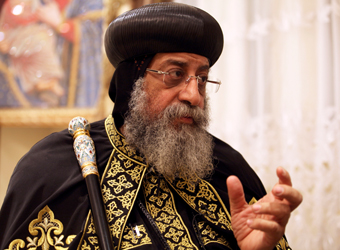Egypt’s Coptic Orthodox Pope Tawadros II attempted on Monday to reassure Egyptians after the recent attacks on Copts in North Sinai
He stressed that the Coptic families that have fled the governorate out of fear of terrorist violence will return to the city when the time is right.
At the start of this month, the Coptic Orthodox Church announced that 143 Christian families had fled North Sinai to Ismailiya after a spate of killings of Christians by Islamist militants in the governorate.
“What happened in El-Arish is a pressure card aimed at dividing the country. These criminal acts of terror are temporary and will be solved soon,” the pope said during a Monday interview with TV host Lamis El-Hadidy on CBC channel.
“The state is taking care of the El-Arish issue,” the pope said, adding that “it was wise of the families who felt danger to leave… during the 1967 war, entire governorates were displaced.”
The series of killings in North Sinai came after the Egyptian affiliate of the Islamic State (ISIS) militant group called on its supporters to attack Christians across the country, in a video in which it claimed responsibility for a deadly attack on a church in Cairo in December.
Several days after the video was released, three Christians were murdered in El-Arish, bringing the number of Christians killed in North Sinai in the last month to seven.
Several of the killings were claimed by Islamic State-affiliated militants.
The pope stressed during the Monday interview that the Egyptian church is one of the main pillars of Egypt, and any act against it or against the police, the army, or the mosque is an act targeting Egypt.
Christians are estimated to make up around 10 percent of Egypt’s population.
When asked about the possibility of protests being held by Copts living in America during President Abdel Fattah al-Sisi’s next visit to the US over the pope’s friendly relations with the state, Tawadros said that this positive relationship is not shameful.
The pope said that Egyptian Christians do face problems, but that they are “minor” and should be dealt with case by case.
He said that a sectarian attack in one village out of 5,000 villages is a “small wound,” but “the body is healthy.”
“There is anger, and I understand it, but the problem is the media presents the news in an exaggerated and harmful way, and this makes Copts, especially abroad, more anxious,” the pope said.
“However, we always tell them that we can deal with our own problems, and we constantly try to reassure them through our churches abroad.”
Tawadros said that the state is doing its best to secure churches, and that he could ask no more of the government in this regard. He also pointed to the fact that the president attended the funeral of the victims of last year’s church bombing in Cairo.
At least 25 people were killed and 49 were injured on 11 December in a suicide bomb attack on the Church of St. Peter and St. Paul, which is attached to Cairo’s main Coptic cathedral in Abbasiya.
The Egyptian Initiative for Personal Rights, a local human rights watchdog, reported in August 2016 that in the first eight months of that year, 10 incidents of sectarian violence took place in the governorate of Minya, which has a high proportion of Christian residents.
During the Monday interview, the pope also praised the recently approved law reforming regulations surrounding the issuing of permits to build churches in the country.
Before the law was passed in August 2016, Christians faced heavy restrictions on building churches in Egypt.
“We were living without a law addressing this issue… the law is an achievement,” the pope said.
“It used to take up to 15 years to approve the building of a church, and it required the approval of the president. But according to the new law, the local governor is the one who gives approval, and should respond [to a request for a permit] within four months, and give justification if he denies the request,” he added.
Tawadros stressed, however, that if there are any problems with the law, they should become evident within the first year after its passing.
Due to the restrictions that existed on building churches, some congregations have been forced to build unlicensed churches or carry out their religious practices in buildings that have not been designated for religious use.
Source: Ahram online


